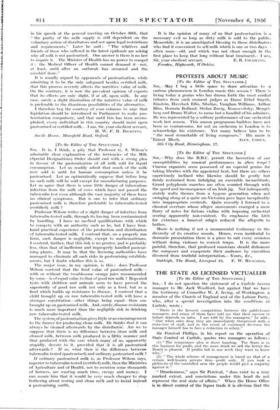[To the Editor of TILE SPECTATOR.] SIR,—It - is, I think,
a pity that Professor G. S. Wilson's admirably clear explanation of the intricacies of the Milk (Special Designations) Order should end with a strong plea in favour of the pasteurisation of all milk sold for liquid consumption. Let us readily admit that much of the milk now sold is unfit for human consumption unless it- be pasteurised. Let us optimistically suppose that before long no such milk will be sold except for manufacturing purposes. Let us agree that there is some little danger of tuberculous infection from the milk of cows which have not passed the tuberculin test even although the vast majority of these have no clinical symptoms. But is one to infer that ordinary pasteurised milk is therefore preferable to tuberculin-tested (certified) milk ?
Professor Wilson writes of a slight danger of infection front tuberculin-tested milk, through its having been contaminated by handling. I have no medical qualifications with which to compete with an authority, such as he, but I have first- hand practical experience of the production and distribution of tuberculin-tested milk. I contend that, on a properly run farm, such danger is negligible, except to mathematicians.
I contend, further, that this risk is no greater, and is probably less, than that of inefficient and improperly handled pasteur- ising plants. It may be that the licensing authorities have managed to eliminate all such risks in pasteurising establish- ments, but I doubt whether this is so.
The major issue, in my opinion, is this does Professor Wilson contend that the food value of pasteurised milk— with or without the troublesome orange juice recommended by some—is of equal value to that of good raw milk ? Repeated tests with children and animals seem to have proved the superiority of good raw milk not only as a food, but as a food which builds up resistance to disease. I contend that a child brought up on raw tuberculin-tested milk will have a sironger constitution—other things being equal—than one brought up on pasteurised milk. And, surely, disease-resistance is much more important than the negligible risk in drinking raw tuberculin-tested milk.
The systenl_of pasteurisation gives little or no encouragement to the farmer- for producing clean milk. He thinks that it can always be cleaned -afterwards by the distributiii. Are we to suppose that ...there is no difference between' clean milk and cleaned niilk,-_betweett -milk produced in' a.-fijthy manner and that produced-with': the care which- Many of us, apparently stupidly, devote AU it, provided that: it -all pasteurised afterwards ? It so, what then is the difference between tnberculin-teSted (pasteurised) and ordinary pasteurised milk ? If ordinary pasteurised- milk is; as Professor Wilson says, superior to tuberculin-tested (certified) milk, then the Ministries of Agriculture and of Health, not to mention some thousands of farmers, are wasting much time, energy and money. I can assure him that it would be very much cheaper to:stop bothering about testing and clean milk and to instal inqtead
a pasteurising outfit. - - It is the opinion of many of us that pasteurisation is a necessary evil so long as dirty milk is sold to the public. Meanwhile, it is an unmitigated blessing to those distributors who find it convenient to sell milk which is one or two days-- often more--old, and which was not clean enough in the first place to keep that long without heat treatment.—I am,














































 Previous page
Previous page